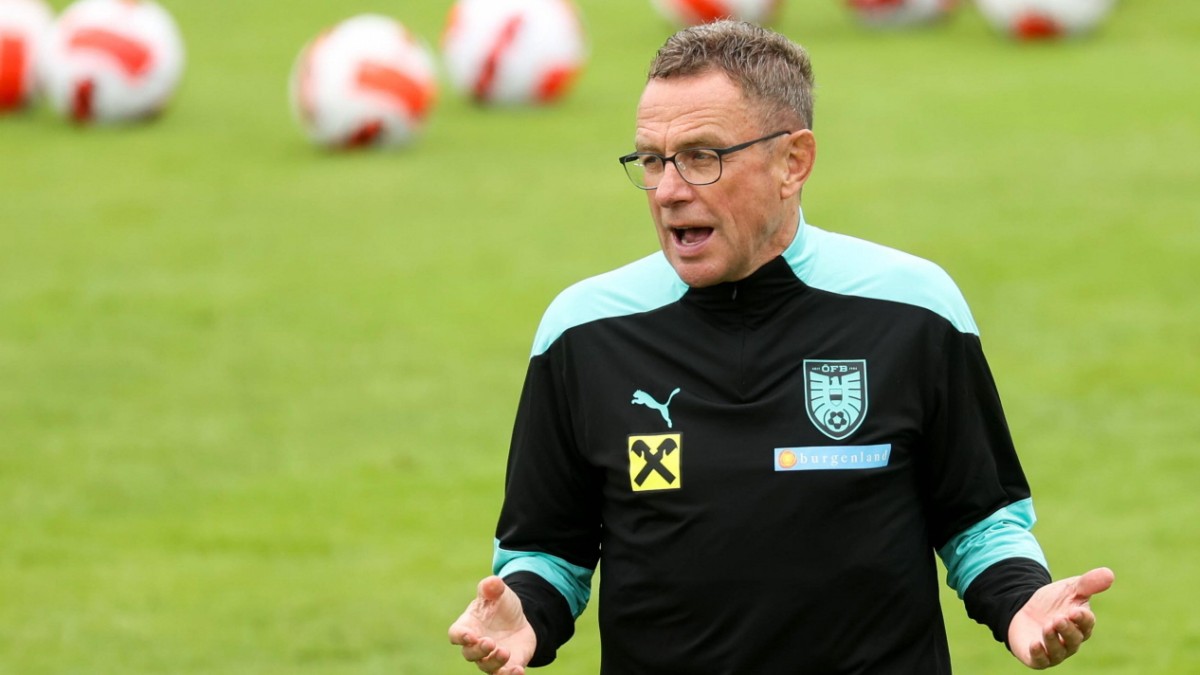Ralf Rangnick took his time, but then gave up his role as a stoic observer. The 63-year-old spent most of his first training session as Austrian team boss on Monday with his arms crossed, observing without having too much visible influence on the training. Then he had sent his team to the waiting fans. And finally, when the hype had died down a bit, he also grabbed a pen himself and was willingly available for autographs and photos, which the numerous school children who had been given extra time off gladly accepted – even if not all of them were named of the new coach, as it turned out when asked.
On day one, under Ralf Rangnick, there was almost something like a folk festival atmosphere in Bad Tatzmannsdorf, a small spa town in Burgenland, where the townscape is characterized by mostly older people in bathrobes on their way to thermal treatments. These days, however, the Austrian national team is preparing for a series of four international matches in the Nations League, with well-known opponents France, Denmark and Croatia. But of course it’s about more than that: At best, a new era in Austrian football has begun on the small training ground in Bad Tatzmannsdorf.
Rangnick’s commitment was accompanied by the expected, critical columnist voices, but above all by surprisingly great enthusiasm for a German coach. Neither the experts nor the fans take it for granted that someone like him, who until recently coached Cristiano Ronaldo, is now getting involved with Austria. The expectations are correspondingly high, sports director Peter Schöttel, for example, opened the press conference on Sunday with the words that Rangnick should not only be good for the national team, but for “the whole of Austrian football”.
In the face of these high demands, Rangnick himself proved that he is a master of his trade, and not only when it comes to football training. In any case, it only took a few words before you could see a clear break between the way his predecessor Franco Foda spoke to the journalists present – and how Rangnick does it. He confidently explained his claims and his philosophy, which is essentially characterized by two elements: First, the team must be stronger than the sum of the individual players. On the other hand, the football played by an Austrian national team must be entertaining for the spectators. And, the claims: “There are countries ahead of us in the world rankings where I don’t know whether this has to be the case,” said Rangnick – he also listed the relevant candidates such as Switzerland, Iran, Morocco and Nigeria.
From his point of view, the potential for such a development is there, as was the case in Salzburg at the time: Rangnick took over the Red Bull cosmos in 2012, when Austria was 19th in the Uefa coefficient ranking, he reported: now the league is in eighth place and has a fixed Champions League starting place. “I don’t see why a similar development shouldn’t be possible with the national team,” said Rangnick, who didn’t shy away from holding up a mirror to the self-absorbed country: “It’s been a long time since Austria drew attention to itself with heroic deeds has” is likely to be one of the sentences by which he will have to be measured in the coming months and years.
Meanwhile, the discussion about a double role is no longer a factor: after the last league game against Crystal Palace, he “by mutual agreement” terminated his contract with Manchester United, said Rangnick, eliminating Austrian concerns that he would not be one hundred percent on his role as team leader. Manchester is in the past, but there are also some parallels with the task in Austria: the talented squad may lack strikers who are ready to start in the front row for Rangnick perfection. In any case, Marko Arnautovic and Sasa Kalajdzic are not among the prototypes of the powerful pressing striker, nor is Cristiano Ronaldo at United.
Rangnick’s elementary task should also be to find the optimal role for David Alaba: Neither under Marcel Koller nor under Foda did the national team have a fixed, orderly concept in which Alaba could play to its strengths, which – meanwhile, with two champions – League titles – lie at the heart of things. Rangnick had once wanted to bring Alaba on loan to Hoffenheim, but ultimately the first attempt failed because he wanted to play in the center as an 18-year-old, but Rangnick needed a left-back. The situation is similar at the moment, the left-back position in Austria is still vacant. However, it is quite conceivable that Alaba will come into its own this time in a chain of three.
On Wednesday he is expected in Bad Tatzmannsdorf in the early afternoon after the celebrations in Madrid, then the final training sessions before the game against Croatia on Friday evening (8.45 p.m.) are scheduled. Alaba should then notice just as quickly as his teammates that the stoic observer and his coaching team have different requirements than last time. The first training was “intensive” and “very, very exhausting”, said a somewhat surprised Kalajdzic, who had expected a relaxed session to get in in front of an audience. Relaxation, according to the first impression from the health resort, is not the priority under Ralf Rangnick in Austria.
–

